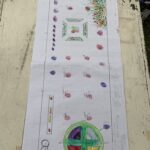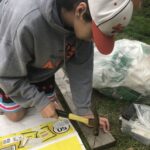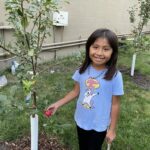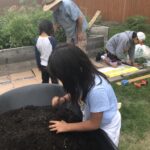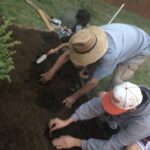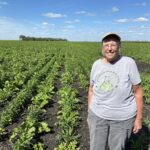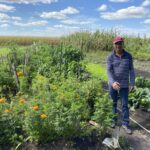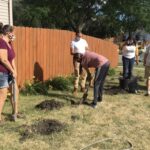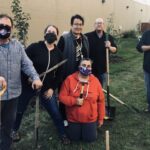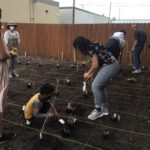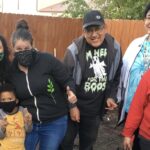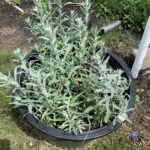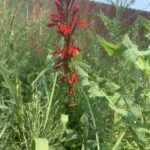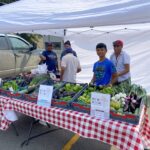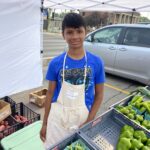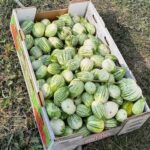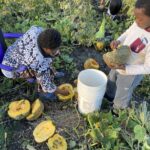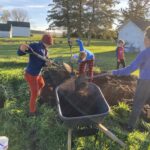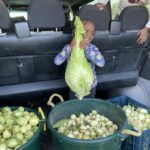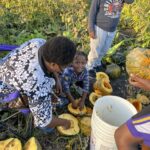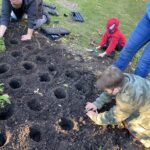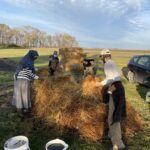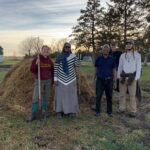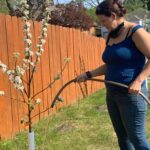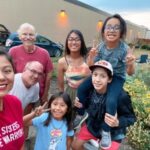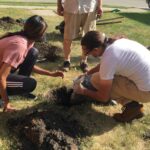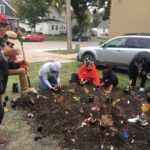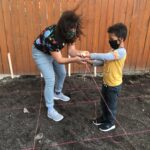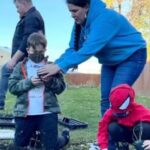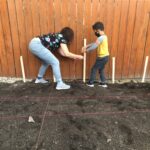Final report for YENC21-162
Project Information
Building on an Indigenous Community Food Orchard/Garden and a multicultural New Roots Farm Incubator Cooperative, this project will introduce youth to careers in regenerative and sustainable agriculture and native habitat restoration utilizing a 10-step k-20 project-based Earth Partnership and Indigenous Arts & Sciences curriculum developed in Wisconsin and Minnesota collaboration with local schools, tribal and community colleges and universities. The project involves students, teachers and community members in habitat restoration, food production on schoolyards, and nearby natural areas. Outcomes will include increased agricultural and environmental awareness/literacy, including regenerating, soil health, carbon sequestration, bio-remediation, perennial crops, pollinators, and other ecosystem services.
- Students, teachers, and community increase sustainable farming/habitat restoration skills through hands-on work with farmers, and natural resource practitioners reinforced by practical work at school and community demonstration sites.
- Youth introduced to sustainable agriculture and natural resource career opportunities through meetings with farmers, grocers, chefs, landscape, and natural resource practitioners.
- Students learn regenerative agriculture and ecological restoration practices through the Earth Partnership curriculum across: place, ecosystem, culture, age, learning style, subject, objectives and standards.
- Youth participate in farmers' markets and environmental, agriculture, and health fairs and events and share project results through a conference presentation and social media.
Cooperators
- (Educator)
- (Educator)
- (Educator)
- (Educator)
- (Educator)
- (Educator)
- (Educator)
- (Educator)
- (Educator)
- (Educator)
- (Educator)
Educational & Outreach Activities
Participation Summary:
From 2021-2023, with our partners, we have been exploring how to share power in truly multicultural ways. Together we:
1. Built a participatory ecosystem of support around 2 VISTAs, and 10 Youth Stewards; Establish a leadership and oversight team for our shared VISTA volunteers and our cooperative work, in which we both oversee our work and live into our multicultural ethos.
2. Hosted a community book read of Reinventing Food Pantries and Banks, by Katie S. Martin. This event included 14 different community organizations and resulted in an impressive list of action items.
3. Hosted family events to educate people about native plants. Collected native seeds to be used in gardens for Summer 2023.
4. Piloted the Youth Stewards program
5. Collected supplies to expand the Youth Stewards program for Summer 2023, with up to 8 Youth Stewards, including books, journals, gardening materials, and a science kit.
6. Made a deposit toward removing asphalt from a parking lot to create a native-plant garden.
7. These activities were funded from other sources
8. Surveyed Indigenous people living in Fargo-Moorhead to uncover their food needs
9. Connected with other food and ecology-focused nonprofits in Fargo-Moorhead, including hosting Inclusive Moorhead, to introduce the community to the Multicultural Youth Food and Ecology initiative (presentation attached in "Media")
10. Participated in the 5th Annual Hunger and Health Summit - Cass Clay Hunger Coalition, Thursday, October 20, 2022, and Great Plains Food Bank Data Walk at Dakota Medical Foundation
11. Continued work at the Gladys Ray Indigenous Community Garden with Youth Steward, Mya Zarazua and about 10 youths and 10 adults. Together they:
a. Hosted participants from an Art & Nature workshop at the Indigenous Association who came to gather native species for an art project and then returned to the IA to engage in using the plants to print them on cloth and then inscribe with Ojibwe phrases & words.
b. Ruth, Mya, Gilma, and Rick visited 10 student gardeners and 4 adults at Lewis & Clark Elementary bringing team-building games and then this group made a reciprocal visit to Gladys Ray where we played Botany Bouquet to make up and learn common names for native plants.
c. Mya, Brian and Rick set up a display at the MSUM Student Community Fair introducing Food & Ecology Initiative to students & other community organizations.
d. Mya, Karla, Carissa, Bentli, Liliana, and Rick set up an exhibit at PANGEA 2022 at the Hjemkomst
e. Mya, Ruth, Brandon, and Amanda presented at the 2023 Indigenous Farming Conference in Grand Rapids, MN, in March.
12. Amina Abdul, Kamaludin Mohammed, and others from the New American Development Agency created a Multicultural Community Garden at Moorhead UCC.
13. VISTA Karla Hernandez convened a weekly Community circle of 6-8 Spanish-speaking individuals seeking to: a. co-create a Nuevo Centro Cultural (New Cultural Center). b. Unite Latinos to discuss problems, possibilities, and our cultural richness and resources c. Explore talents, assets, experiences, and strengths d. Build relationships, listen to each other, and celebrate our common cultural richness e. Address barriers, language, economic, cultural f. Create a culturally safe place to gather
14. We hosted Carlos Mariani, Executive Director of MN Education Equity Partnership and PRAIRIE Board Member met with MnEEP staff, and attended a Regional Convening at Concordia College. 15. Karla participated in a panel at the First Tri-College Latino Conference 16. LEDC farmer trainer Rodrigo Cala met with New Roots and potential Latino farmers in Moorhead & Pelican Rapids Stories that highlight the impact One of the goals of the MYFE initiative is to inspire young people to be involved in food production, to create career pathways that can increase the diversity of food producers in our community.
We are establishing a paid internship-style program called Youth Stewards. In the fall of 2022, we hired our first Youth Steward, a 14-year-old youth named Kenny. As part of our program, he received his first paycheck. He was very proud of earning his own money. Kenny worked with us collecting seeds from the untouched prairie. He assisted our seed consultant and helped others collect seeds. He helped lead a workshop for families on identifying native seeds. Kenny has grown from a shy kid to someone who is willing and able to share his ideas. He will continue on with us into the summer of 2023, as we recruit 4-7 other youths to work alongside him.
When our VISTA volunteer, Carissa Brownotter, started with us last August, she had the idea of reading and discussing as a community the book Reinventing Food Pantries. She became aware of the book through prior work at the Emergency Food Pantry and believed that it could have a profoundly positive effect on the food benevolence programs in Fargo-Moorhead. She immediately began visiting other food organizations to make connections and gauge the possibility of hosting this event. We quickly teamed up with the Emergency Food Pantry to promote the book read, ordered books and got them out into the community. The day was amazing. We partnered with the Heart & Soul Community Café to provide food. We had 14 organizations in attendance. The conversations were deep and fruitful. Here are some of the commitments made by people who attended the event:
1. Increase and improve training for food bank/pantry employees and volunteers in order to shift the understanding of clients from “needy” to “empowered customers.”
2. Interview pantry guests to uncover their specific food needs, in order to better match available food to stated needs and decrease food waste.
3. Recruit bank/pantry volunteers from customers, in order to both staff pantries, but also blur power lines between volunteers and customers.
4. Increase collaboration between food programs
5. The beginning of a cooking program tied to fresh food from the pantries and from local farmers, for clients, was born. Grant dollars have purchased a food dehydrator to kick off the program.
6. Increase two-way communication with elected officials
7. An email list of participants that will keep the conversation going
8. Increase opportunities for people to grow their own food and develop food enterprises.
A 2023 NEW ROOTS Farm Incubator cohort has just concluded 10 sessions with 5 experienced farmers and 5 beginning women farmers. They are from Burundi, Congo, and Bhutan. Three Kurdish women are in need of garden plots. Two more Burundian families have arrived from Vermont. They want to farm too.
Learning Outcomes
Constructing raised beds and containers, amending soil, mulching; Planting, watering, weeding vegetables, fruit trees and shrubs, native pollinator plants working cooperatively, following directions, planning circle meetings, remote presentations on "Wigwametry", Indigenous wisdom, Earth Partnership 10 steps overview, virtual field trip to Prairie Wetlands Learning Center. Observed larger-scale compost pile making, planting, weeding, and watering larger garden-scale vegetables e.g. 750 African eggplants, harvesting squash seeds to be sold for roasted "pepitas," potatoes, onions, and tomatoes. Observed large-scale soil-building cover-cropping for organic conversion of 51 acres; selling at 2 farmers markets.
Project Outcomes
We built a coalition of more than 25 organizations including the City of Moorhead, Cass-Clay Food Commission, Moorhead School District, Resilient Moorhead (a coalition of 21+ organizations), Soil and water conservation districts, 5 post-secondary institutions, 3 New American and 3 Native American community organizations, Churches United for the Homeless, Heart-n-Soul Cafe, Dorothy Day Food Pantry, and others to launch an Urban Youth Food and Ecology Initiative.
The Urban, Youth, Food, and Ecology Initiative applied for funds from the MN Department of Agriculture Urban Agriculture, the MN Bureau of Soil and Water Resources "Lawns to Legumes Demonstration Neighborhood Grants Program" and will submit a request to the UMN NW Regional Sustainable Partnership program, and to MDNR's "No Child Left Inside" grant in March. We actually did not receive support from these proposals but did from West Central Initiative Resiliency Fund and the FM Area Foundation. What has ensued is the continued growth of new partnerships with additional organizations and individuals including Americorps VISTA, Indigenous Association, FM Hunger Coalition, Fargo Emergency Food Pantry, Red River Harvest Co-op, Latino Economic Development Center, Inclusive Moorhead, and others.
One Indigenous family became involved including an 18-year-old community college student, her 15-year-old high school student brother and his friends, and their 9-year-old twin brother and sister, and frequently Mom & Dad were a mainstay of the garden over the season. The college student presented table displays at several student activities, festivals, and conferences and continues to guide students in a Youth Stewards initiative. Another Latino family continues to help at the garden and community farm, with one 11-yr old helping as a junior Youth Steward. Project participants invited the former 30-year director of the Youth Farm project in the Twin Cities to visit and inspire strategic planning for the Youth, Food & Ecology Initiative as it prepares to involve additional youth at two existing sites, the Indigenous and New American gardens, and possibly a third new site in 2023. Two young adult participants have become VISTA volunteers who help facilitate the gardens.
The Interim-director of an indigenous organization relates how the garden was used to inspire a group of young people in a summer art institute to learn about the dye possibilities of native plants that were used as pigments for a cultural textile and Indigenous language hands-on art projects....

